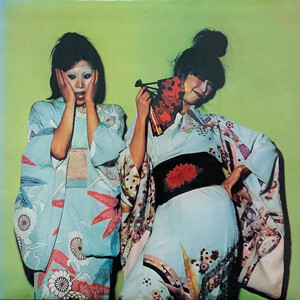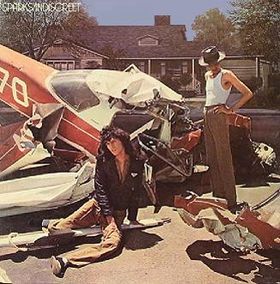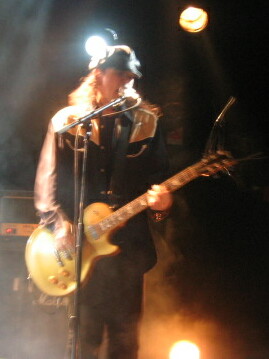A kimono is a Japanese traditional garment.
Contents
Kimono may also refer to:
A kimono is a Japanese traditional garment.
Kimono may also refer to:

The kimono is a traditional Japanese garment and the national dress of Japan. The kimono is a wrapped-front garment with square sleeves and a rectangular body, and is worn left side wrapped over right, unless the wearer is deceased. The kimono is traditionally worn with a broad sash, called an obi, and is commonly worn with accessories such as zōri sandals and tabi socks.
Diesel may refer to:
A bush or shrub is a small or medium woody plant.
Hakama are a type of traditional Japanese clothing. Originally stemming from kù, the trousers worn by members of the Chinese imperial court in the Sui and Tang dynasties, this style was adopted by the Japanese in the form of hakama in the 6th century. Hakama are tied at the waist and fall approximately to the ankles. They are worn over a kimono specially adapted for wearing hakama, known as a hakamashita.
Obi or OBI may refer to:

Ronald David Mael is an American musician, songwriter, composer and record producer. He is the keyboard player and principal songwriter in the band Sparks, which he founded with vocalist, occasional songwriter and younger brother Russell Mael in 1971. Mael is known for his quirky and idiosyncratic approach to songwriting, his intricate and rhythmic keyboard playing style and for his deadpan and low key, scowling demeanour onstage often remaining motionless over his keyboard in sharp contrast to Russell's animated and hyperactive frontman antics. Ron Mael is also noted for his conservative clothes and distinctive moustache. The Mael brothers are the founders of Lil' Beethoven Records.

Russell Craig Mael is an American singer best known as the lead singer for the band Sparks, which he formed in 1971 with his elder brother Ron Mael. Mael is known for his wide vocal range, in particular his far-reaching falsetto. He has a flamboyant and hyperactive stage presence which contrasts sharply with Ron Mael's inexpressive demeanour. The band released an album with British rock band Franz Ferdinand, as the supergroup FFS, titled FFS, released in 2015. The Mael brothers are the founders of Lil' Beethoven Records.

Sparks is an American pop and rock duo formed by brothers Ron (keyboards) and Russell Mael (vocals) in Los Angeles. The duo is noted for their quirky approach to songwriting; their music is often accompanied by sophisticated and acerbic lyrics—often about women, and sometimes containing literary or cinematic references—and an idiosyncratic, theatrical stage presence, typified by the contrast between Russell's animated, hyperactive frontman antics and Ron's deadpan scowling. Russell Mael has a distinctive wide-ranging voice, while Ron Mael plays keyboards in an intricate and rhythmic style. Their frequently changing styles and visual presentations have kept the band at the forefront of modern, artful pop music.
Connecticut is a state of the United States in the New England region.

Kimono My House is the third studio album by American rock band Sparks, released on May 1, 1974, by Island Records. The album is considered to be their commercial breakthrough, and was met with widespread acclaim.

Indiscreet is the fifth album by Sparks. It was released in 1975 and later re-released with three bonus tracks. The album was a departure from the glam rock sound of Kimono My House and Propaganda, and emphasised the theatrical elements of their work, with greater use of orchestral arrangements and drawing from non-rock orientated styles such as jazz, big band, swing, vaudeville, and classical music. The album was produced by Tony Visconti, with whom the group reunited in 1997 to produce several tracks for their retrospective album Plagiarism. The song "How Are You Getting Home?" was used in Leos Carax's film Holy Motors.

Çà et là du Japon is the thirteenth and final studio album by Japanese pop band Pizzicato Five. The album was released on January 1, 2001 by Readymade Records. Like many of the band's later albums, Çà et là du Japon is set in a famous city of the world during a specific time of the year, in this case Tokyo in winter. Çà et là du Japon differs from other Pizzicato Five albums, in that it features several guest vocalists, songwriters, and lead vocalist appears on only a few of its songs.
Yukihiro is a Japanese musician, best known as drummer of the rock band L'Arc-en-Ciel since 1998. He also sings and plays bass for his solo project Acid Android, and drums for the supergroup Petit Brabancon. Before joining L'Arc-en-Ciel he was in the popular visual kei bands Zi:Kill and Die in Cries.

Steven Shane McDonald is an American rock musician, best known as the bass guitarist in the Los Angeles alternative rock/power pop band Redd Kross. He is a founding member of the hardcore punk band OFF! – serving as a member from 2009 to 2021 – as well as bassist for Melvins since 2015. McDonald has appeared in numerous film projects with his older brother Jeff McDonald, including the 1984 film Desperate Teenage Lovedolls and its sequel Lovedolls Superstar; and the 1990 film Spirit of '76.

James Wilson is an American musician and singer, best known as a guitarist in the rock bands Mother Superior and Rollins Band. He is known for his soulful vocals and powerful blues rock guitar work. He also plays guitar and bass with Daniel Lanois. Wilson hails from Delaware, but currently resides in Los Angeles.
Amajlija is a Serbian and Yugoslav rock band formed in Novi Sad in 1979. Led by vocalist and guitarist Bogoljub "Čombe" Banjac, Amajlija reached the peak of popularity in the late 1980s and early 1990s with their melodic hard rock sound.

kimono are an Icelandic-Canadian math rock band, formed in 2001. The group consists of Alison MacNeil, Gylfi Blöndal and Kjartan Bragi Bjarnason. Blöndal is also a member of Hudson Wayne and Mr. Silla and Bjarnason plays drums Seabear and has performed on a number of other Icelandic independent albums.

Kimono Draggin' are an American prog-punk band formed in 2003 from New Haven, Connecticut. The lineup consists of Joseph Nolan, Yossi Hatton, and Chris Swirski. Their version of progressive rock is strongly influenced by bands of the 1970s and 1980s including The Stooges, The Mothers of Invention, Talking Heads and Minutemen. As Patrick Ferrucci quotes, "It’s party rock with an edge and an intelligence. There’s wit and wildness just swimming around in Kimono’s music". Mark Suppanz of The Big Takeover describes the music as "...noisy, souped-up rock saturated with a healthy dose of reckless abandon and a raw, unpolished and in-your-face sound".

Teresa Suárez Cosío, commonly known by her stage name Teri Gender Bender, is an American singer and musician, known primarily as the founding member, lead singer, and guitarist of Guadalajara-based rock band Le Butcherettes since 2007. With Omar Rodríguez-López, she is a member of Bosnian Rainbows, Crystal Fairy and Kimono Kult. Her performance persona and artistry have been compared to Björk, Siouxsie Sioux, Karen O, and the first artistic stage of Gloria Trevi.

Norman Victor "Dinky" Diamond was a British drummer who played with the rock band Sparks at the height of their fame in the UK in the early 1970s, playing on the albums Kimono My House (1974), Propaganda (1974) and Indiscreet (1975). In 1975 Diamond was voted Drummer of the Year in a poll held by Premier Drums. He committed suicide by hanging in 2004 after a long-running dispute with noisy neighbours.